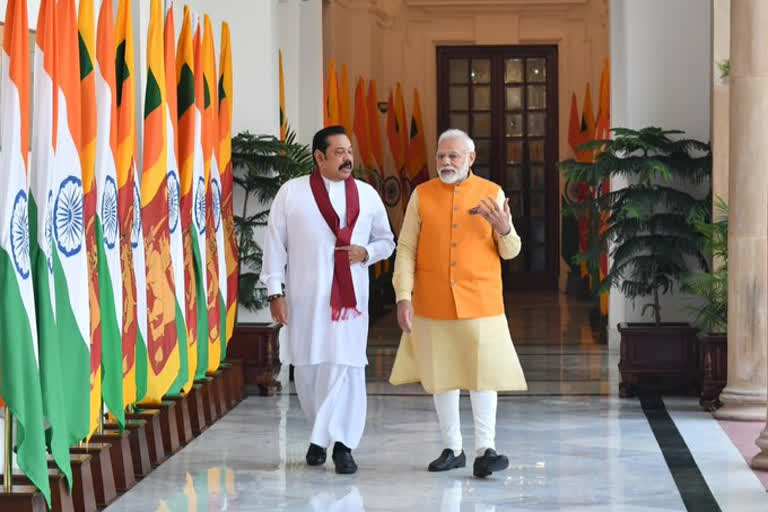New Delhi: India on Saturday sought devolution of powers by the Sri Lankan government to the minority Tamils in the island nation and hoped that their aspirations for equality, justice and respect will be fulfilled as per provisions of the country's Constitution.
After wide-ranging talks with his Sri Lankan counterpart Mahinda Rajapaksa, Prime Minister Narendra Modi said the issue was discussed with an "open mind" and hoped that the Tamil reconciliation process would be taken forward by Colombo.
Read also: Sri Lanka Prez in India: Rajapaksa meets Ajit Doval
The two leaders also deliberated on a raft of key issues like bolstering anti-terror cooperation, expansion of trade and investment ties, implementation of joint projects in Sri Lanka and resolving the long-festering fishermen issue with a "humane approach".
In his comments, Rajapaksa thanked Modi for his government's 'neighbourhood first policy' and the priority he attaches to ties with Sri Lanka.
Read also: Sri Lankan President invites PM Modi to visit Ceylon
Rajapaksa's five-day visit to India assumes significance as his tenure as Sri Lanka's president from 2005 to 2016 saw expansion of China's footprints in the Indian Ocean island nation, triggering concerns in India.
Noting that India has been a "trusted partner" in Sri Lanka's development, Modi said stability, security and prosperity in the island nation are important for the country as well as for the entire Indian Ocean region.
On the long-pending Tamil issue, Modi said that it will be necessary to implement the 13th amendment of the Sri Lankan Constitution.
The 13th amendment provides for devolution of power to the Tamil community in the neighbouring country.
"We held a discussion with an open mind on issues relating to reconciliation in Sri Lanka. I am confident that the government of Sri Lanka will fulfil the expectations of the Tamil people for equality, justice, peace, and respect within a United Sri Lanka," Modi said.
"It will be necessary to implement the 13th amendment of (Sri Lankan) Constitution and take forward the reconciliation process at the same time," he said.
India has been pressing Sri Lanka to implement the 13th amendment which was brought in after the Indo-Sri Lankan agreement of 1987 which envisaged devolution of powers to the Tamils.
Calling terrorism a major threat facing the region, Modi mentioned about the 'Easter Day terror attacks' in Sri Lanka last year and asserted that both countries will expand cooperation to deal with the challenge.
"We both countries have fought this problem firmly. There were painful and barbaric terrorist attacks on Easter Day in Sri Lanka in April last year.
"These attacks were not only a blow to Sri Lanka, but also to humanity. In our talks, we discussed furthering our anti-terror cooperation," Modi said.
Rajapaksa said that a part of the discussions centred around ensuring security for both the countries, and expressed gratitude to India for helping his country in countering terrorism.
"India is our closest neighbour and long-standing friend. The close historical links have provided a solid foundation to our ties," Rajapaksa said.
Referring to the fishermen issue, Modi said both sides have decided to adopt a humanitarian approach in dealing with it.
"We also discussed the fishermen issue. It directly affects the livelihood of the people of both countries. Therefore, we agreed to continue to adopt a constructive and humanitarian approach in dealing with the issue," he said.
The prime minister said the history of Indo-Lanka relationship has been woven with countless threads like culture, religion, art and language.
"Whether it is security or economy or social progress, our past and our future's every field are interlinked."
India had announced financial assistance of USD 450 million to Sri Lanka, including USD 50 million to fight terrorism, during the visit of the country's President Gotabaya Rajapaksa in November.
"We deliberated on joint economic projects in Sri Lanka as well as to enhance trade and investment relations. We also discussed ways to deepen people-to-people contact, promote tourism and improving connectivity," Modi said.
Mahinda, elder brother of Sri Lankan President Gotabaya Rajapaksa, arrived in New Delhi on Friday on a five-day visit, his first overseas tour after being appointed as prime minister of the island nation in November last year.
After his official engagement in New Delhi, Mahinda Rajapaksa will travel to Varanasi, Sarnath, Bodh Gaya and Tirupati.
In the morning, the Sri Lankan prime minister was given a ceremonial welcome at the Rashtrapati Bhavan.
Earlier, External Affairs Minister S Jaishankar called on the Sri Lankan prime minister.
With inputs from PTI



